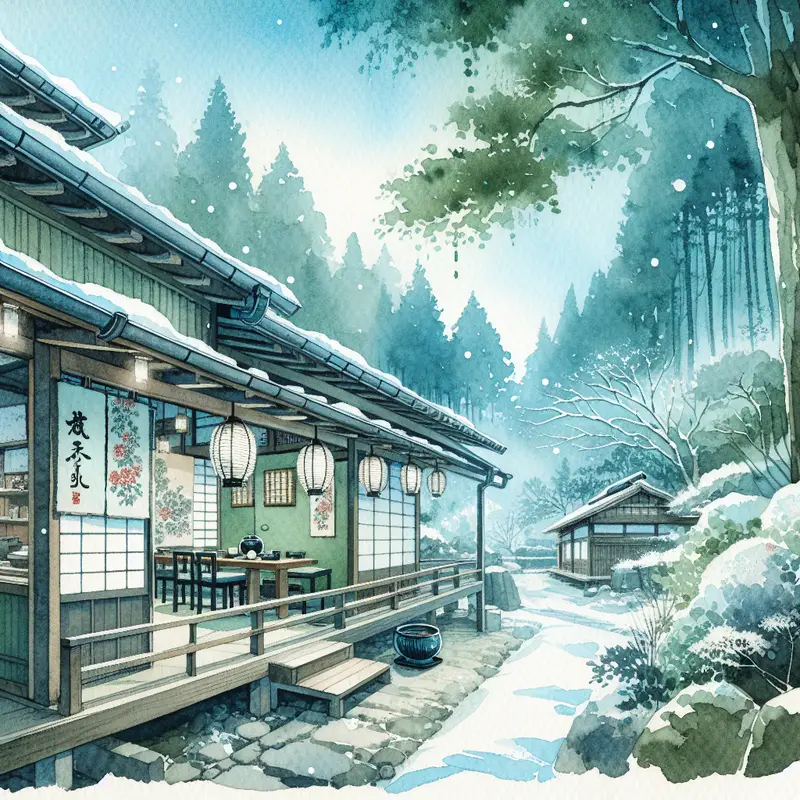What Ikigai Looks Like
Published on March 11, 2025

Immersive Atmosphere
Today, I visited a small restaurant that offered a pure Japanese experience—so authentic, in fact, that I was the only foreigner there. It was not merely a meal; it was an immersive cultural and sensory journey, deeply reflective of the profound Japanese concept of Ikigai.
The restaurant was nestled far from the bustle of town, quietly secluded and peaceful. Upon entering, the ambiance was immediately striking: soft-spoken staff, customers exchanging quiet conversations, and only the soothing background sounds—the gentle crackling of the roasting fire and utensils subtly scraping pans.
This small one-room building was filled with character. Its rustic decor, rough yet thoughtfully arranged, created an environment that, though slightly cluttered, was undeniably tasteful and charming. There were three cooking stations, a small counter for guests, and another for payments, all within close proximity, enhancing the intimate atmosphere.
The Meal: Ritual and Artistry
The lunch stretched gracefully over two hours, featuring seven courses served slowly, deliberately, and simultaneously to all eight patrons. Each course appeared deceptively simple—beautifully presented and modestly portioned—but the sophistication and subtlety of flavors revealed extraordinary culinary craftsmanship.
Between each course, the chef would emerge, smiling broadly, passionately explaining every dish. She detailed the ingredients' origins, the special techniques applied, and the reasoning behind each flavor pairing. Her enthusiasm was contagious, amplifying the anticipation and appreciation for every bite.
The Choreography of Passion
The kitchen staff—a team of three, including the chef herself—operated with incredible precision and harmony. Their movements were finely tuned, choreographed flawlessly. Such an effortless display of careful preparation and collaboration revealed meticulous behind-the-scenes planning.
Despite their immense effort and attention to detail, the meal was surprisingly affordable at around $40 USD. Given the time, skill, and labor involved, I struggled to imagine how minimal the financial return must have been for such dedication.
The Mystery of ROI
From a purely financial standpoint, this restaurant’s model might appear inefficient. How could such intricate planning, preparation, and execution yield adequate returns at such modest pricing? However, viewing this purely through a financial lens misses the broader context of what was being offered.
Understanding Ikigai
The chef’s performance perfectly embodied the Japanese principle of Ikigai—a philosophy describing the intersection of passion, mission, profession, and vocation. Ikigai is about finding deep fulfillment through work that:
- You love doing,
- You're skilled at performing,
- Brings genuine value to others,
- Provides sufficient compensation to sustain your lifestyle.
The chef at this restaurant clearly loved her work, her skill unquestionable, her enthusiasm infectious. While perhaps not maximizing financial returns, she earned something far richer: the sincere appreciation, respect, and gratitude of every customer. This connection, this human exchange, is integral to Ikigai, enriching the lives of both the giver and receiver.
More Than Just a Meal: The Value of Experience
This dining experience was far more than simply eating—it was an encounter with thoughtful hospitality, profound respect for craftsmanship, and an authentic cultural tradition. It was a masterclass not just in cooking, but in delivering a memorable and impactful human experience.
The chef and her team went beyond mere functional expectations, immersing their guests in a deeper sensory journey. This emphasis on experience elevated the meal into a reflection of abundance, echoing the ideas previously explored in From Function to Taste: Why Good Design Matters.
Conclusion: Witnessing True Ikigai
This lunch was not just food—it was a heartfelt demonstration of Ikigai in action. It reminded me that true success isn't solely about optimizing financial returns, but also about living and working with passion, excellence, and deep personal meaning. Witnessing such genuine expression of purpose was a privilege and a lasting inspiration.